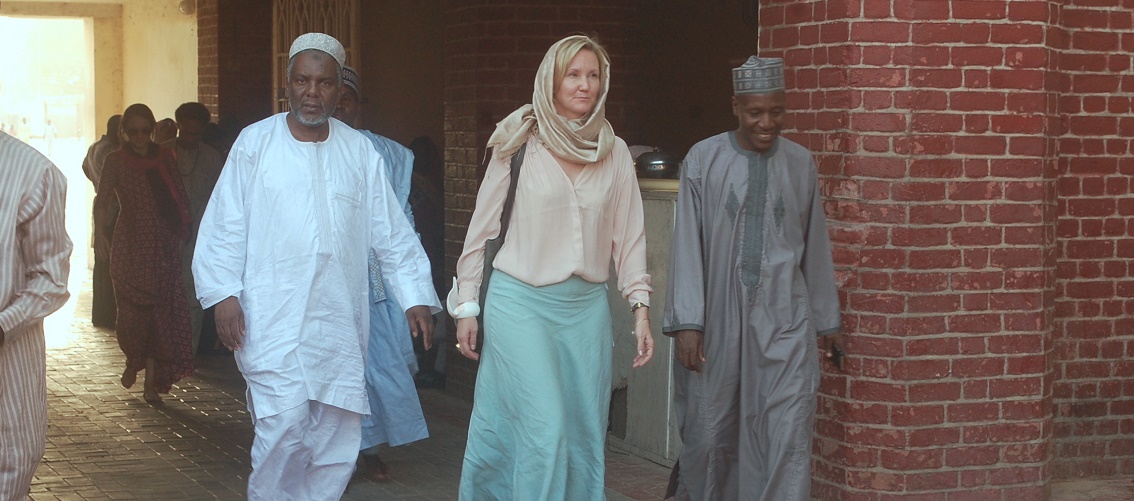It’s Time We Change the Table in Peace Processes
Publication Date: March 2021

Women’s Leadership in Peace and Security
A Blog for International Women’s Day
Adapted from remarks by Meredith Preston McGhie at the Global Alliance of Women Mediators events in October 2020
We have spoken for decades about the need for women to play substantive and central roles in peace and security – at all levels, in all areas, and at all stages of a peace process. We have talked about the need for change in peacemaking for the past 20 years.
20 years.
Sanam Anderlini, CEO and founder of International Civil Society Action Network, remarked that if we were looking at the rate at which a child learns to read, or at the profits of a company, or at any other metric of advancement, the inching progress of the last 20 years on women, peace and security would simply be unacceptable.
While some gains have been made, International Women’s Day is an opportunity to reflect on what is needed for the road ahead. We live in polarised, divided times. Inequality and conflict have proved themselves more durable than our efforts towards peace and equality. This moment of challenge offers us the possibility to do things differently.
We must push for greater recognition and action around women’s roles in peacemaking. However, we must also address the fact that, structurally, peace processes today are failing to deliver sustainable peace. Peacemakers, men and women alike, work under extremely challenging conditions with extraordinary commitment. But our collective results continue to fall short.
What if we worked, collectively, to transform the system? To engage in peacemaking in new ways that enable women’s central participation as core to the approach, rather than as an add-on?
It’s time to question the system of peacemaking
2020 was a year of questioning systems and thinking about how to pull down the systemic barriers that impede full and safe participation in so many areas of society. This year, we must move towards action. Peacemaking should be subjected to the same critical reflections. While we need practical solutions to advance women’s leadership, engagement, recognition and protection in peacebuilding and mediation, we must work to transform the system as a whole.
It’s time to push for a redesign of the peacemaking table
If we, as women, know these systems do not work, we should not push for a seat at the table alone. We should be pushing for the entire table, room, building and infrastructure to be re-designed. At the Global Centre for Pluralism, we are focused on re-imagining peace processes – not to stop the current violence alone – but, rather, to build sustainable, inclusive, peaceful and prosperous societies.
So, are we pushing enough for structural change? And what can we do to support women peacebuilders in this shift?
It’s time to push the international community to a higher standard
I believe that as peacemakers, we need to push the international community who support these processes to a higher standard towards peaceful and inclusive societies. As we were reminded often this past year, the burden for change too often lies with those excluded.
Those with power in the multilateral system need to see the real advantages to engaging women peacemakers for global peace and stability. This is a global security issue, not simply a “women’s issue”. Real political authority should be placed behind commitments to support women peacemakers.
This support from the international community should seek to develop transformative approaches to multilateral peacemaking. This requires an embrace of diverse voices at the heart of the multilateral system, rather than at the periphery. In every discussion in the UN Security Council, for instance, diverse voices should be integral to decision-making.
There are many governments, including my own in Canada, that could lead the way by, for example:
- ensuring diverse voices are present both virtually and in person,
- supporting translation for women speaking from their own contexts, and
- pushing for new approaches to consultations
This approach requires more time, effort, resources and a different way of listening and consulting. We can do this and, at the same time, improve how we support women peacemakers on the ground, by considering how we fund women peacemakers.
It’s time to push for better funding and support for women
Currently, there is too much competition for resources. Funding for women peacemakers is often difficult to access and restrictive. A range of creative approaches could be explored. For instance, we could push for a “universal basic income” for grassroots women peacebuilders, or for endowments for women’s peacebuilding movements to ensure more sustainable long term funding, or a global trust fund to support women peacebuilders.
This funding should be accompanied by the political support needed to address the fundamental power imbalances that undermine the inclusivity of and ultimately the success of peace processes.
It’s time for new thinking
Financial support for woman peacemakers is only one area where we can start making structural change. Working towards a truly transformative approach that centers pluralism in the entire process, is another. I hope that we can develop some new thinking, and expand further the boundaries of inclusion that we have been pushing for the past 20 years.
There is power in coming together with regional and global networks to amplify the voices of women to shift the power balances in the current system. These networks can bring together actors at all levels – women at the grassroots, in formal processes, governments and other peacemakers committed to change.
International Women’s Day provides an opportunity to elevate these voices and call for change, while reminding the global community that this must be an ongoing year-round effort. The time to initiate this change is now.
